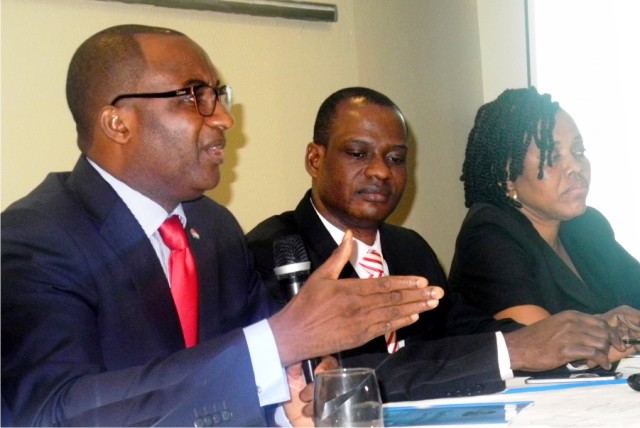Business
PH Firm Sues SEC Over Dehumanising Treatment

The Chief Executive Officer (CEO) of Flexus Global Solution and Investment Limited, Mr. Henri Kounougna, has decried what he called a dehumanizing treatment meted on the company’s workers by the Securities and Exchange Commission (SEC) from Abuja.
Speaking during a press briefing at Flexus office in Port Harcourt, the CEO said that SEC officials came to their office, brutalised workers, sealed –the office and bundled the staff, some clients and the management team to the Mini-Okoro Police station and later to the state CID in Port Harcourt.
He stated that the SEC harassement team also carried from Flexus office seven big HP laptops, two Desk top computers, one video monitor, intercom mobile phone, identity card Printer, Transaction files and other valuables, adding that there was no information prior to the time of the embarrassement.
He noted that the company has filed a suit against SEC and its cohorts seeking over N500 million damages and interpretation of the SEC Act No. 29, 2007 in relation to the operations of the firm which is a co-operative investment company.
In a suit No. FHC/ABJ/CS/995/2016 between Flexus Global Solutions and Investment Ltd Port Harcourt, Flexible co-operative Investment and Credit Society Limited (Plaintiffs) and Securities and Exchange Commission, Onuoha Onucha, Mrs Tinsha Immanuella, Gurantee Trust Bank Plc and Diamond Plc, who are defendants in the suit before the Federal High Court of Nigeria holden at Abuja.
The 22nd/point of the 25 points suit stated “I know as a fact that even in appropriate cases where there is violation of any provision of the Investment and Securities Act No. 29, 2007, the Act does not make provision for arrest and detention of anybody for any breach whatsoever with respect to any provision of the investment and Securities Act No. 29, 2007.
The Act does not also empower the 1st and 3rd Defendants to freeze bank accounts”, which they have done to the company.
The suit would soon be slated for hearing in the Abuja high court.
Lilian Peters
Transport
Automated Points Concession : FAAN Workers Gave 72hrs To Revise Decisions In PH

Transport
FAAN Announces Pick-Up Points for Go-Cashless Cards

Business
Fidelity Bank To Empower Women With Sustainable Entrepreneurship Skills, HAP2.0
-
Politics2 days ago
2027: NIGERIANS FAULT INEC ON DIGITAL MEMBERSHIP REGISTER DIRECTIVE
-

 Environment2 days ago
Environment2 days agoLAWMA Director Says Sweeping Reforms Have Improved Waste Collection
-
Politics2 days ago
LP Crisis: Ex-NWC Member Dumps Dumps Abure Faction
-

 Politics2 days ago
Politics2 days agoUmahi Dismisses Allegations On Social Media, Insists On Projects Delivery
-

 Sports2 days ago
Sports2 days agoAbia Not Sure To Secure continental Ticket
-
Sports2 days ago
La Liga: Yamal Records First Career Hat-trick
-

 Sports2 days ago
Sports2 days agoCity Survive Leeds’ Challenge At Elland Road
-
Politics2 days ago
IT’S A LIE, G-5 GOVS DIDN’T WIN ELECTION FOR TINUBU – SOWUNMI

